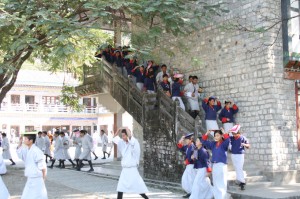UNDP in Bhutan
As a responsive development partner, UNDP will work together with the government and the people of Bhutan to enhance GNH, reduce inequalities, build resilience and empower the disadvantaged. UNDP will contribute to effective development results through innovative partnerships, cutting-edge global knowledge, and technical and financial resources.
The United Nations Development Programme has been supporting the Royal Government of Bhutan (RGoB) and the Bhutanese people since 1973 although it was officially established only in 1979.
UNDP assistance in Bhutan began with an initial allocation of USD 2.5 million for the first country programme (1973-1976) coinciding with the fifth and sixth Five Year Plans. Prior to 1996, UNDP assistance primarily focused on civil aviation, telecommunications, private sector, energy, tourism and media. Currently, UNDP's supports inclusive, sustainable progress in people's lives, their needs, efforts and rights.
Although UNDP's work in Bhutan is largely cross-sectoral, the Gross National Happiness Commission (GNHC) is UNDP's main partner agency as all national development plans, policies and programmes are monitored, evaluated and screened by the commission.
What do we want to accomplish?
Over the years, UNDP's support for Bhutan has mostly been guided by the Millennium Development Goals (MDGs) and is derived from the United Nations Development Assistance Framework (UNDAF) 2008-2013.
The Country Programme Document (CPD) is derived from UNDP’s Multi-Year Funding Framework (MYFF). All activities are owned and implemented by national partners with a cross cutting emphasis on gender mainstreaming in the areas of:
Economic Integration and Innovation
To further reduce poverty to less than five percent and multi-dimensional poverty rate to 10 percent by the end of 2018, UNDP helps in mainstreaming pro-poor environment while ensuring biodiversity conservation. To Deliver As One, the UNDP, along with other UN agencies, is also supporting the government to mobilize resources with an aim to enhance employment and income generation and create enabling environment for private sector growth, especially for cottage and small rural enterprises.
To ensure transparent, accountable and inclusive development, UNDP continues to support anti-corruption efforts and efficient public service delivery built on the foundations of sound financial management. UNDP also partners with media and civil society to promote people’s right to information.
In collaboration with other UN agencies and development partners, UNDP also supports decentralisation of local governance systems through capacity development and e-governance at local and national levels.
Climate Change Mitigation & Energy
To address emerging environmental concerns into national policies, plans and programmes, UNDP has been providing cross sectoral technical support to enhance national capacities so that Bhutan is able to meet its committments to International Environmental Agreements.
UNDP partners with government and private sectors to help rural communities access affordable energy technologies while ensuring biodiversity conservation.
UNDP has also been supporting stakeholder and community capacity building to better implement the national disaster risk management. By mainstreaming disaster and climate risk reduction into national polices, UNDP aims at supporting successful disaster risk management initiatives for better disaster preparedness and response.
Climate Change Adaptation & Disaster Risk Reduction
By partnering with local and central governments, non-governmental organizations and other international agencies, UNDP promotes policies and implementation of community-based disaster risk management projects.
UNDP also mobilizes resources to strengthen community resilience to climate change impacts by diversifying livelihoods, improving climate change database. This is geared towards protecting communities from natural calamities.
UNDP Bhutan Milestones
Since the beginning of its involvement in Bhutan, UNDP has played key roles in:
1979: National airline development.
1986: Development of Kuensel as a weekly national newspaper.
1989: Telecommunications Master Plan development.
Mid 80s-Early 90s: launch of the largest global UNV programme in Bhutan.
1996: Establishment of the Bhutan Trust Fund for Environmental Conservation.
2006: Establishment of the Anti-Dorruption Commission & formulation of the National Disaster Risk Management Framework.
2008-2013: Glacial Lake Outburst Floods project on climate change in Punakha & Wangdue.
2009: Emergency assistance after Cyclone Aila floods & earthquake in Eastern Bhutan.
2011: Emergency assistance after the 2011 earthquake.
2013: Development of the National Internal Control Framework.
2014: Launch of the largest climate change adaptation programme in Bhutan.
Who are the decision makers?
Ms. Niamh Collier-Smith is the UNDP Bhutan Deputy Resident Representative and the Resident Representative a.i.
UNDP's work is divided into four broad portfolios (thematic areas) led by portfolio managers, which are:
1. Climate Change Mitigation and Energy - headed by Mr. Nawaraj Chhetri (nawaraj.chhetri@undp.org)
2. Economic Integration and Innovation - headed by Mr. Jigme Dorji (jigme.dorji@undp.org)
3. Inclusive Governance - headed by Mr. Namgay Wangchuk (namgay.wangchuk@undp.org)
4. Climate Change Adaptation & Disaster Risk Reduction - headed by Mr. Chimi Rinzin (chimi.rinzin@undp.org)
How many are we?
Total staff strength: 34
| Operations: | 10 |
| UNDP Front Office: | 3 |
| Resident Coordinator's Unit: | 4 |
| Climate Change Adaptation & Disaster Risk Reduction (CCA & DRR) | 3 |
| Climate Change Mitigation & Energy (CCM & Energy): | 2 |
| Inclusive Governance: | 5 |
| Economic Integration & Innovation (E2I): | 4 |
| Partnerships & Assurance Unit (PAU): | 3 |
